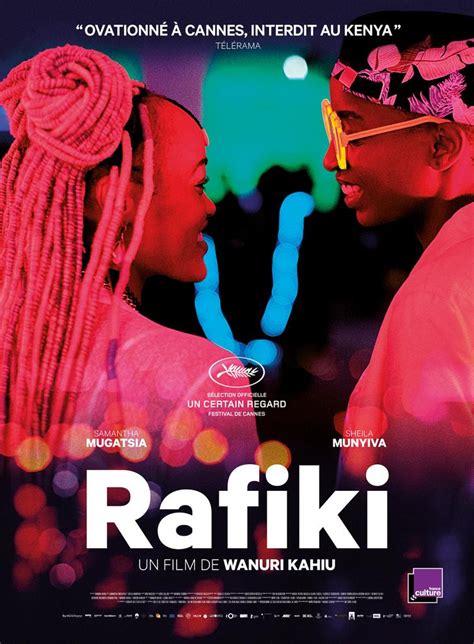Rafiki

Description:
Rafiki is a vibrant Nairobi-set romantic drama about Kena and Ziki, two teenage girls who fall in love despite family pressure, social norms, and a climate of fear. As their secret bond grows, their communities, friends, and authorities complicate their choices, forcing them to confront risk, loyalty, and the cost of daring to love. Directed by Wanuri Kahiu, the film blends luminous color palettes with intimate performances and a bold, hopeful message about resilience and joy.Keywords:
Africa, Romantic Drama, LGBTQ+ Romance, Coming Of Age, Kenyan CinemaWhat type of animal is Rafiki?
In the movie "Rafiki," Rafiki is a mandrill, which is a type of primate. Mandrills are known for their distinctive colorful faces and are native to the rainforests of central and western Africa. In the context of the film, Rafiki serves as a wise and guiding figure, often associated with themes of wisdom and connection to tradition. The character is also a notable figure in Disney's "The Lion King," where Rafiki plays a similar role as a wise mentor.
What does Rafiki mean?
"Rafiki" is a Swahili word that means "friend." The film "Rafiki," directed by Wanuri Kahiu, explores the friendship and romantic relationship between two young women, Kena and Ziki, in Kenya. The title reflects the theme of friendship and love amidst societal challenges and familial expectations. The film gained international attention for its portrayal of LGBTQ+ relationships in a context where such themes are often stigmatized.
What is Rafiki's famous quote?
In the film "Rafiki," a notable quote is, "You can’t choose who you love." This line encapsulates the central theme of the film, which explores the challenges of love and acceptance in a society that is often intolerant. The story follows two young women, Kena and Ziki, who navigate their feelings for each other amid familial and societal pressures in Kenya. The quote reflects the struggle for authenticity and the right to love freely, making it a powerful moment in the narrative.
Why was Rafiki banned?
The film "Rafiki," directed by Wanuri Kahiu, was banned in Kenya shortly after its release in 2018 due to its portrayal of a same-sex relationship between two young women. The Kenyan Film Classification Board cited the film's promotion of homosexuality, which is illegal in Kenya, as the reason for the ban. However, the film was allowed to screen for a short time after a court ruling that deemed the ban unconstitutional, emphasizing freedom of expression. Despite the controversy, "Rafiki" received international acclaim for its storytelling and representation.
Explore More Categories:
Beat Generation Cooking Dinosaurs Scientific Discovery Sin Entropy Supernatural Truth Seeking Bigfoot First Love Crime Investigation Dreamlike Identity Transformation Discovery Detective Sibling Rivalry Sisterhood Mobsters Racism Defection Quirky Humor Exploration Australian Outback Existential Existential Dread